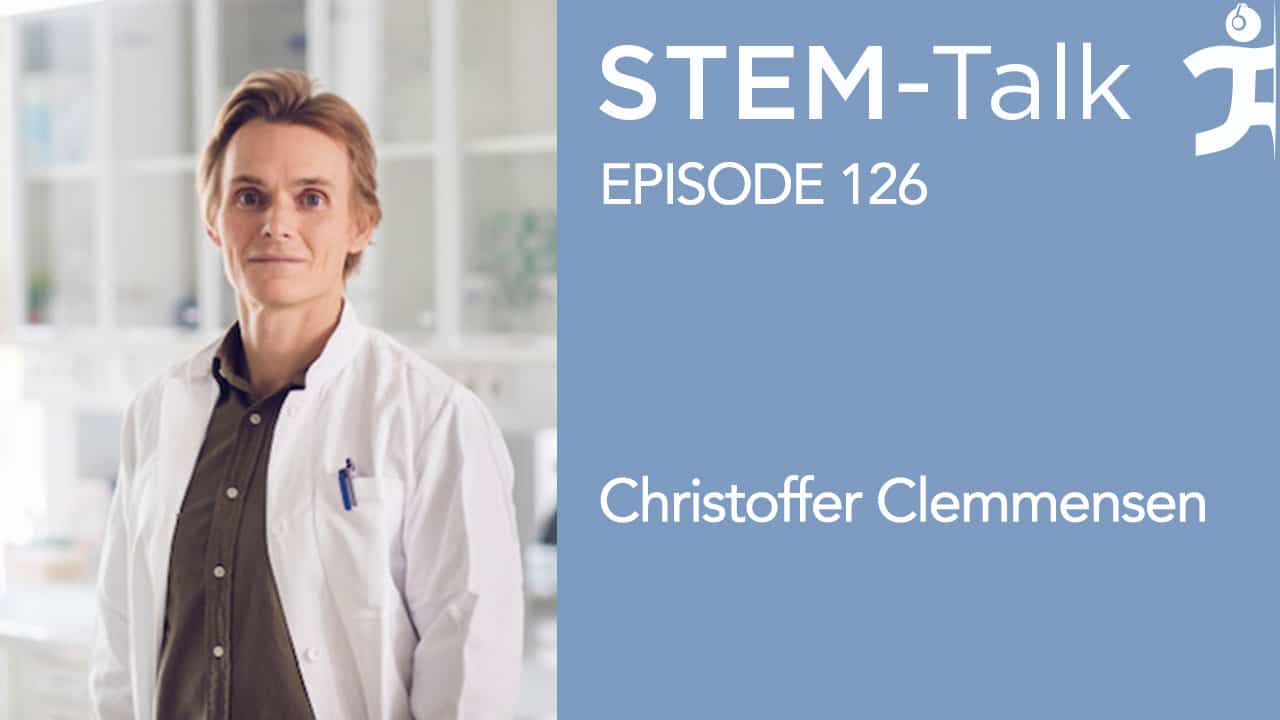STEM-Talk
Episode 126: Christoffer Clemmensen discusses therapeutic strategies to correct obesity and its disorders
// Aug 4, 2021

Our guest today is Dr. Christoffer Clemmensen, an associate professor and lead researcher at the University of Copenhagen’s Novo Nordisk Foundation Center for Basic Metabolic Research.
Christoffer’s lab at the university explores pharmacological and therapeutic treatments for obesity and its related diseases and disorders. He and his colleagues focus on dissecting the neuroendocrine signals involved in coordinating appetite, food-motivated behavior, energy expenditure, glycemic control, and lipid metabolism.
We have a fascinating discussion with Christoffer about his lab’s efforts to turn molecular and physiological insights into innovative therapeutic strategies that Christoffer hopes someday can reduce obesity and its associated metabolic disorders. Christoffer is a native of Denmark who earned his Ph.D. in Molecular Pharmacology from the University of Copenhagen in 2013.
Joining Ken for today’s interview is IHMC colleague and senior research scientist Dr. Marcas Bamman, who was our guest on episode 116. Marcas is the founder and former director of the University of Alabama at Birmingham Center for Exercise Medicine. Marcas joined IHMC last year as a Senior Research Scientist.
Show notes:
[00:03:24] Marcas asks Christoffer about growing up in a small rural town in Denmark in the 1980s and ‘90s. [00:04:05] Christoffer’s talks about his days as an elite tennis player when he was a youth. [00:04:41] Ken asks Christoffer when he first became interested in science. [00:05:48] Marcas asks Christoffer what changed his mind about wanting to study computer science at university. [00:07:04] Christoffer explains how he decided to attend University of Copenhagen. [00:08:19] Marcas mentions that Christoffer’s original focus at university was on exercise biology, but that he became fascinated by the mechanisms of obesity and that interest took him in a new direction. Marcas asks how that shift in interest came about. [00:10:01] Marcas follows up on the previous question and asks if there were a particular instance that persuaded Christoffer to switch from focusing on exercise to focusing more on weight control and obesity. [00:10:40] Ken asks what led Christopher to pursue a Ph.D. in molecular pharmacology after attaining a bachelor’s degree in exercise biology and a master’s degree in human biology. [00:12:11] Marcas asks Christoffer why he went to Munich, Germany, as a postdoctoral fellow at the Helmholtz Diabetes Center after completing his post-doc at the University of Copenhagen. [00:14:00] After mentioning that Christoffer eventually became the group leader at Helmholtz, Ken asks Christoffer why he then transitioned back to the University of Copenhagen. [00:14:52] Marcas asks Christopher to talk about the big questions that get to the heart of his research. [00:16:20] Ken mentions that Christoffer is now an associate professor at the Nova Nordisk Foundation Center for Basic Metabolic Research at the University of Copenhagen, where he is the head of the Clemmensen Group. Ken goes on to mention that the Clemmensen Group’s website says the lab focuses on dissecting the neuroendocrine signals that coordinate appetite regulation, food-motivated behavior, energy expenditure, glycemic control, and lipid metabolism. Ken asks if Christoffer could give an overview of what all these research focuses entail. [00:18:17] Marcas mentions that obesity and its related diseases, such as type-2 diabetes and cardiovascular disease, have become serious problems affecting the world’s public health and global economy. Marcas goes on to say that Christoffer’s 2019 paper titled “Emerging hormonal-based combination pharmacotherapies for the treatment of metabolic diseases” makes the observation that the treatments we have been using to deal with this problem have not been able to effectively reverse the staggering rates of obesity we’re witnessing around the world. Marcas asks Christoffer to talk about this paper and how it underscored the need for better treatments of obesity. [00:19:48] In light of the need to target multiple signaling pathways to effectively treat obesity that Christoffer described in his 2019 paper, Ken asks Christoffer to explain the hormonal-based pharmacotherapies that he has been looking into as potential treatments for obesity. [00:21:58] Marcas asks Christoffer why an overwhelming majority of people who do manage to lose weight end up gaining the weight back, and what are the most effective therapies to help keep the pounds off once a person does lose weight. [00:23:56] Marcas mentions that Christoffer followed his 2019 paper with a review in PLOS Biology that looked at the evolutionary and environmental perspectives on human body weight. The paper asks the question, “Why are we not all obese?” Marcas, considering that poignant question, asks Christoffer why everyone isn’t prone to gaining weight in the same way. [00:26:44] Ken mentions that he has heavy doubts that our species experienced a recent biological change that would have caused a massive increase in obesity within the last 30-80 years, given that only a few decades ago most people were slender. [00:27:52] Marcas asks about the elusive slimming gene, mentioning that biologists have identified the physiological agents that keep our fat mass from becoming too low, but have had trouble understanding the exact mechanisms that regulate excess fat. He asks Christoffer to expound upon the current research as well as evidence dating back to the 1950s for the existence of a blood-borne, weight-gain preventive molecule. [00:30:09] Ken asks Christoffer about other factors that regulate energy balance in the body. [00:32:10] In light of the fact that a chronic state of positive energy balance leads to weight gain, Ken asks Christoffer what he believes is the key pathway to target, whether it be appetite control, energy expenditure, or a combination of both. [00:34:14] Marcas asks Christoffer to explain the remarkable differences between brown fat and white fat, and in this context to summarize his 2018 paper in nature communicationsthat described the potent effects of stimulating brown fat thermogenesis with a drug called icilin. [00:37:14] Marcas mentions that Christoffer’s paper in PLOS Biology addressed how geneticists are starting to uncover potential weight-gain defense genes. The paper, however, argues that for humans to fully benefit from such research, physiologists will have to play a role in the interpretation of such genetic discoveries. Marcas asks Christoffer what kind of collaboration he thinks is necessary between physiologists and geneticists. [00:39:08] Ken asks if the fact that the human genome has stayed stable throughout the rise in obesity over the past several decades suggests that epigenetic modifications play a role, and if Christoffer thinks that differences in obesity susceptibility across individuals might be partially explained by differences in the epigenome. [00:41:28] Marcas asks what the current status of pharmacological obesity treatment is and if Christoffer anticipates that landscape changing in the near future. [00:43:43] In terms of translating promising results in rodents to humans, Ken asks Christoffer to describe the specific challenges we face in using rodents to understand obesity in humans. [00:47:18] Ken mentions the overreliance on weight and BMI as measurements as opposed to body composition, which depreciates the value of muscle as an energy storing organ. [00:49:03] Marcas mentions that the model for pharmacological treatment of obesity seems to be leaning towards suppression of appetite. Marcas asks if such an agent were to be found, how successful does Christoffer think it would be in the long term if the pharmacotherapy was given in the absence of a behavioral change. [00:51:16] Marcas asks Christoffer to elaborate on his belief in the importance of omic-methods as well as how he is using such methods in his own research. [00:53:17] Ken asks about the greatest benefits, as well as the challenges, of using an untargeted approach to metabolomics profiling, which Christoffer wrote about in his 2020 article addressing molecular changes in the body following bouts of endurance and resistance exercise. [00:56:05] Ken asks how Christoffer decided which metabolites to study more closely in the aforementioned study. [00:57:14] Marcas mentions that Christoffer’s aforementioned 2020 study focused on physiological changes that took place within a few hours of exercise. Marcas goes on to mention that efforts are underway to better understand such acute molecular changes in the context of longer-term training, as the acute responses to exercise in a sedentary human are likely to be much different than the acute response of a trained individual. Marcas asks how we can learn from the range of responses in trained vs. untrained states as it pertains to weight management mechanisms or other health benefits. [00:59:08] Marcas brings up Christoffer’s most recent paper published earlier this year in Nature Communication, in which Christoffer asks the question: How does the exercise-and-appetite-related protein GDF15 act in different contexts? Marcas goes on to mention that the paper found that GDF15 acts differently based on whether it is endogenously produced or pharmacologically applied and asks Christoffer to talk about this in more depth. [01:04:00] Marcas explains that exercise-response molecules, of which there are a number, are dose dependent, which is to say that they are produced more, or stay in the body longer, depending on the mode and or intensity of the exercise. He goes on to ask if GDF15 has any dose dependency associated with it in respect to the magnitude of elevation and time it stays elevated. [01:06:30] Marcas congratulates Christoffer on his research gaining more attention and his lab growing to about a dozen people. [01:07:57] Marcas asks Christoffer what he does to stay in shape and if he still plays tennis. [01:08:52] Ken closes the interview asking if this is Christoffer’s first podcast interview in English and if Christoffer enjoys listening to podcasts.Links:






